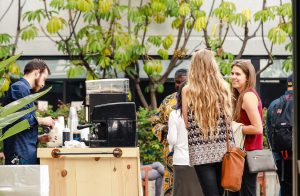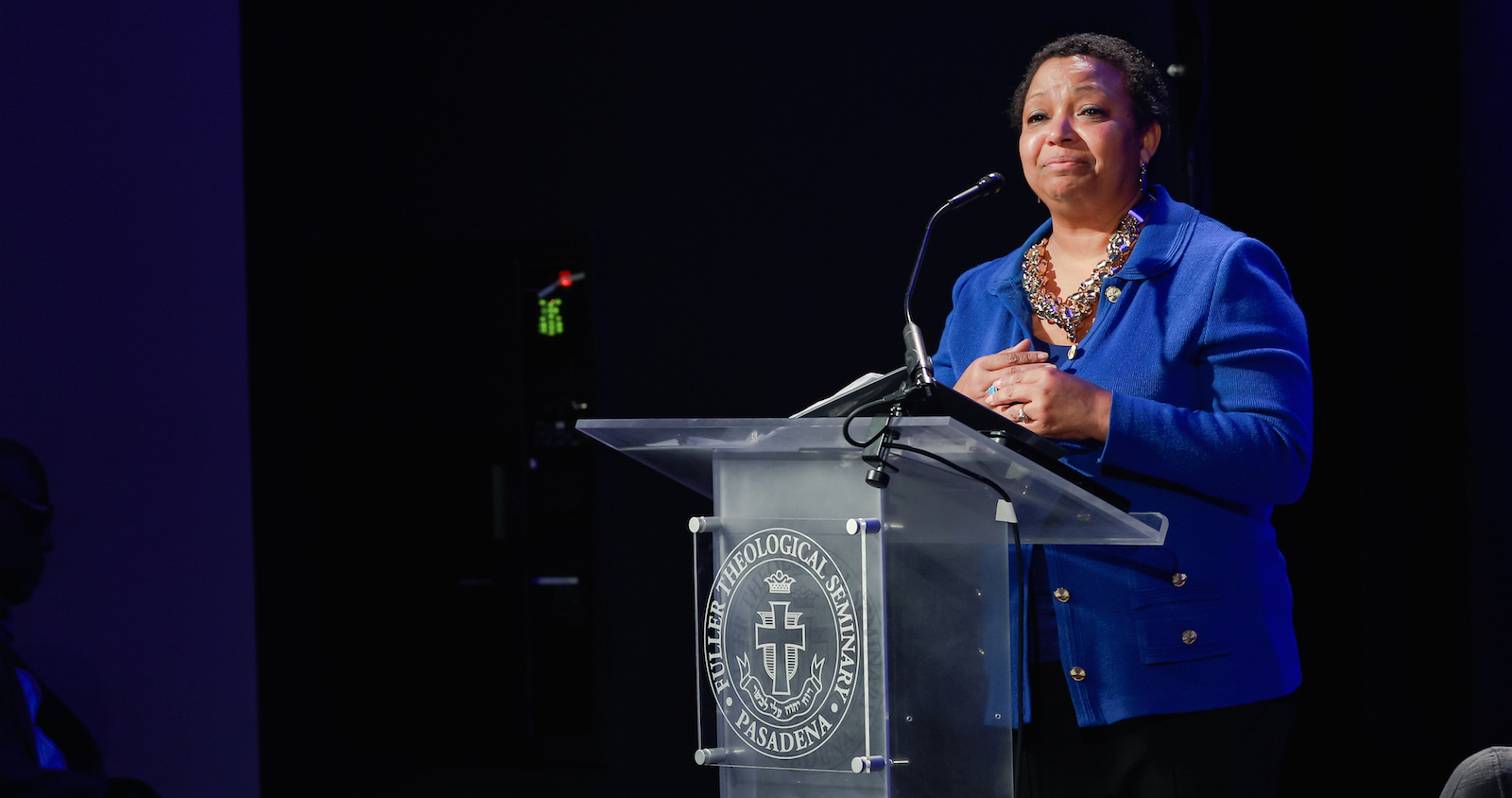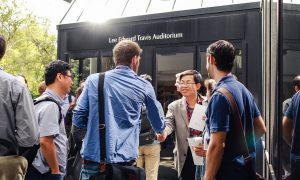“We are joined at the site of the dirt. And the dirt is our kin. From dust and to dust we will return. We are of the dirt—the dirt! Even geographic distance and the difference of strange tongues cannot thwart this truth: we are creatures bound together. But it was precisely this recognition and the historic resistance that showed itself so powerfully in the emergence of whiteness.”
 + Willie Jennings, associate professor of systematic theology and Africana studies at Yale Divinity School, discusses “whiteness” as a sociocultural framework in which missions developed and imperialized the locations on which it descended, and offers a way to uncouple Christian faith from whiteness by means of a theology of place. Mark Labberton, the president of Fuller Seminary, responds. Watch his lecture from the event above, and explore a variety of lectures and responses from Fuller faculty below. Pictured right, students enjoy coffee and conversations before the lectures.
+ Willie Jennings, associate professor of systematic theology and Africana studies at Yale Divinity School, discusses “whiteness” as a sociocultural framework in which missions developed and imperialized the locations on which it descended, and offers a way to uncouple Christian faith from whiteness by means of a theology of place. Mark Labberton, the president of Fuller Seminary, responds. Watch his lecture from the event above, and explore a variety of lectures and responses from Fuller faculty below. Pictured right, students enjoy coffee and conversations before the lectures.
+ William E. Pannell, professor emeritus of preaching, provides an introduction to the 2017 Missiology Lectures and discusses the need to question and engage the realities and evils of racism.
+ Andrew T. Draper, assistant professor of theology and director of the Honors Guild at Taylor University, explores the vulnerability and repentance necessary for “whiteness” to be joined with others in order to decenter its false universal claims. Erin Dufault-Hunter, assistant professor of Christian ethics, responds.
+ Jonathan Tran, associate professor of theology and ethics at Baylor University, discusses how harmful black-white binary views of race plague mission efforts within the Asian American experience. Daniel D. Lee, assistant provost for the Center for Asian American Theology and Ministry and assistant professor of theology and Asian American ministry, responds.
+ Elizabeth Conde-Frazier, academic dean and vice president of education at Esperanza College of Eastern University, discusses the professionalism of the church and theological education as expressions of racism and broken praxis, in particular through their roots in mission efforts in 19th-century Latin America. Lisseth Rojas-Flores, associate professor of marriage and family therapy, responds.

“The conversation about race is one that has been deferred for so long and so often over and over again. As soon as we get close to having a meaningful conversation about race, we recoil from the pain of it. And so in our lectures you’ll see some of that pain emerge, you’ll see some people who have long experienced racism express and declare and name experiences that they have had that have been deeply formative, deformative even. So this conversation is not a pretty one, but we’re having it.”
 + Love Sechrest, associate professor of New Testament, pictured above. Listen to her prayer for justice below. The Fuller Missiology Lectures is an annual conference held by the School of Intercultural Studies. Its 2017 theme, “Race, Theology, and Mission,” considered the issue of race through a multicultural lens. Discussions aimed to develop historical, theological, interdisciplinary, and missiological approaches to race that can interrogate conventional thinking about ethnoracialism, colorism, and hierarchicalism (in its various manifestations across gender, economic, and class lines), even while revitalizing Christian witness and practices of racial justice, reconciliation, and peace in the present time. Listen to all of the 2017 Missiology Lectures here:
+ Love Sechrest, associate professor of New Testament, pictured above. Listen to her prayer for justice below. The Fuller Missiology Lectures is an annual conference held by the School of Intercultural Studies. Its 2017 theme, “Race, Theology, and Mission,” considered the issue of race through a multicultural lens. Discussions aimed to develop historical, theological, interdisciplinary, and missiological approaches to race that can interrogate conventional thinking about ethnoracialism, colorism, and hierarchicalism (in its various manifestations across gender, economic, and class lines), even while revitalizing Christian witness and practices of racial justice, reconciliation, and peace in the present time. Listen to all of the 2017 Missiology Lectures here:
